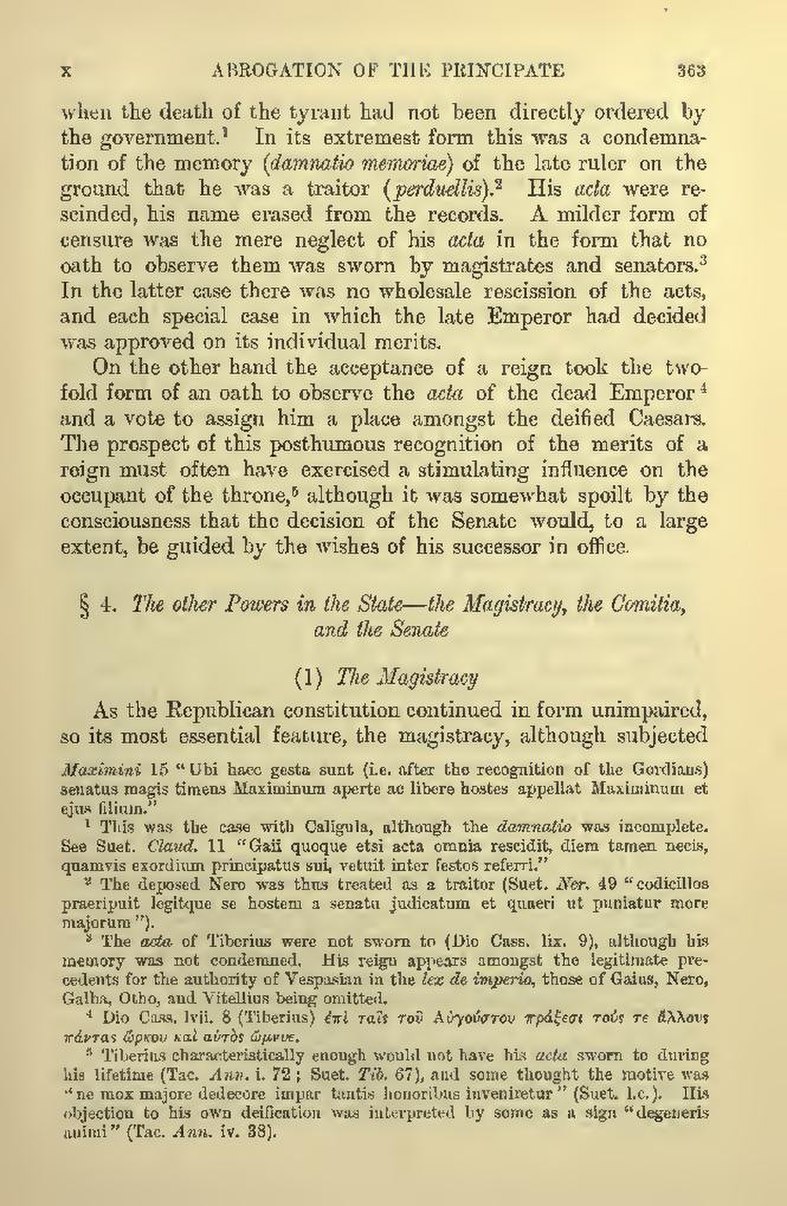when the death of the tyrant had not been directly ordered by the government.[1] In its extremest form this was a condemnation of the memory (damnatio memoriae) of the late ruler on the ground that he was a traitor (perduellis).[2] His acta were rescinded, his name erased from the records. A milder form of censure was the mere neglect of his acta in the form that no oath to observe them was sworn by magistrates and senators.[3] In the latter case there was no wholesale rescission of the acts, and each special case in which the late Emperor had decided was approved on its individual merits. On the other hand the acceptance of a reign took the two-*fold form of an oath to observe the acta of the dead Emperor[4] and a vote to assign him a place amongst the deified Caesars. The prospect of this posthumous recognition of the merits of a reign must often have exercised a stimulating influence on the occupant of the throne,[5] although it was somewhat spoilt by the consciousness that the decision of the Senate would, to a large extent, be guided by the wishes of his successor in office. § 4. The other Powers in the State—the Magistracy, the Comitia, and the Senate
(1) The Magistracy
As the Republican constitution continued in form unimpaired, so its most essential feature, the magistracy, although subjected
- [Footnote: Maximini 15 "Ubi haec gesta sunt (i.e. after the recognition of the Gordians)
senatus magis timens Maximinum aperte ac libere hostes appellat Maximinum et ejus filium."].]
- ↑ This was the case with Caligula, although the damnatio was incomplete. See Suet. Claud. 11 "Gaii quoque etsi acta omnia rescidit, diem tamen necis, quamvis exordium principatus sui, vetuit inter festos referri."
- ↑ The deposed Nero was thus treated as a traitor (Suet. Ner. 49 "codicillos praeripuit legitque se hostem a senatu judicatum et quaeri ut puniatur more majorum").
- ↑ The acta of Tiberius were not sworn to (Dio Cass. lix. 9), although his memory was not condemned. His reign appears amongst the legitimate precedents for the authority of Vespasian in the lex de imperio, those of Gaius, Nero, Galba, Otho, and Vitellius being omitted.
- ↑ Dio Cass. lvii. 8 (Tiberius) [Greek: epi tais tou Augoustou praxesi tous te allous pantas ôrkou kai autos ômnue
- ↑ Tiberius characteristically enough would not have his acta sworn to during his lifetime (Tac. Ann. i. 72; Suet. Tib. 67), and some thought the motive was "ne mox majore dedecore impar tantis honoribus inveniretur" (Suet. l.c.). His objection to his own deification was interpreted by some as a sign "degeneris animi" (Tac. Ann. iv. 38).
